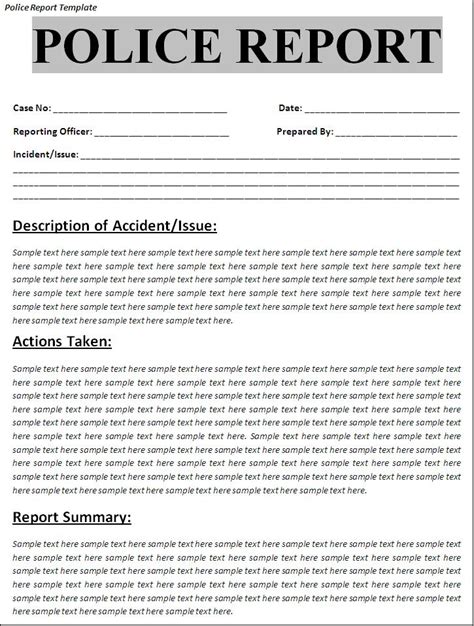Immediate Action: File Your Police Report Today
Experiencing a crime or witnessing an incident can be incredibly jarring. The immediate aftermath is often filled with confusion, shock, and a sense of urgency. Knowing what steps to take can significantly impact the investigation and your ability to recover from the event. One of the most crucial actions you should take is filing a police report immediately. This article will guide you through the process and explain why prompt reporting is essential.
Why is Filing a Police Report Immediately Important?
Delaying a police report can severely hinder the investigation. Here's why prompt action is crucial:
-
Preservation of Evidence: The sooner officers arrive at the scene, the higher the chance of preserving crucial evidence. This could include fingerprints, DNA, security footage, or witness testimony that might disappear or become less reliable over time.
-
Increased Chances of Apprehension: Fresh leads are significantly more valuable to investigators. Immediate reporting allows officers to act quickly, potentially leading to the quicker apprehension of suspects.
-
Insurance Claims: Most insurance companies require a police report before processing claims related to theft, vandalism, or other crimes. A timely report ensures a smoother claims process.
-
Legal Documentation: A police report serves as official documentation of the incident. This record is vital if you decide to pursue legal action or require it for other official purposes.
-
Peace of Mind: Reporting the incident can provide a sense of closure and control in a stressful situation. Knowing that authorities are aware and actively working on the case can alleviate some of the anxiety and uncertainty.
What Information Should I Have Ready Before Calling?
Before contacting the police, gather as much information as you can. This will expedite the reporting process and help officers understand the situation effectively. Try to have the following information ready:
- Your Name, Address, and Contact Information: This is essential for the officers to reach you.
- Date, Time, and Location of the Incident: Be as precise as possible with the time and location.
- Description of the Crime or Incident: Provide a clear and concise account of what happened.
- Description of the Suspect(s): Include any physical characteristics, clothing details, and any distinguishing features.
- Details of Any Stolen or Damaged Property: Note down serial numbers, brands, and any identifying features. If possible, take photos before moving anything.
- Names and Contact Information of Witnesses: If there were any witnesses, their testimony can be invaluable to the investigation.
What Happens After I File the Police Report?
Once you file your report, the officer will take a statement and gather additional information. You'll likely receive a case number, which you should keep for future reference. The investigation may take time, but the police will keep you updated if necessary. Depending on the nature of the crime, you may be asked to provide additional information or participate in follow-up interviews.
What if I'm Unsure if I Should File a Report?
Even if you're hesitant or unsure about the severity of the incident, it's always better to err on the side of caution and file a report. The police are there to help, and their assessment will determine the appropriate course of action.
How Do I File a Police Report?
You can usually file a police report by:
- Calling your local police department's non-emergency number.
- Going to your local police station in person.
- Using an online reporting system (if available). Many police departments offer online reporting systems for less urgent crimes.
Remember, every situation is unique. It's always advisable to contact your local police department directly for the most accurate and up-to-date information on how to file a report.
What if I am Afraid to Report the Crime?
Understanding the fear associated with reporting a crime is vital. Many victims feel intimidated, vulnerable, or even threatened by the prospect of involvement with law enforcement. Remember that you are not alone and there are resources available to support you through this process. Victim support organizations can offer guidance, advocacy, and emotional support to ensure you feel safe and empowered throughout the process. Contacting such an organization alongside or before reporting to the police could make the entire experience less daunting.
This article is for informational purposes only and does not constitute legal advice. Always consult with the appropriate authorities for specific guidance.

